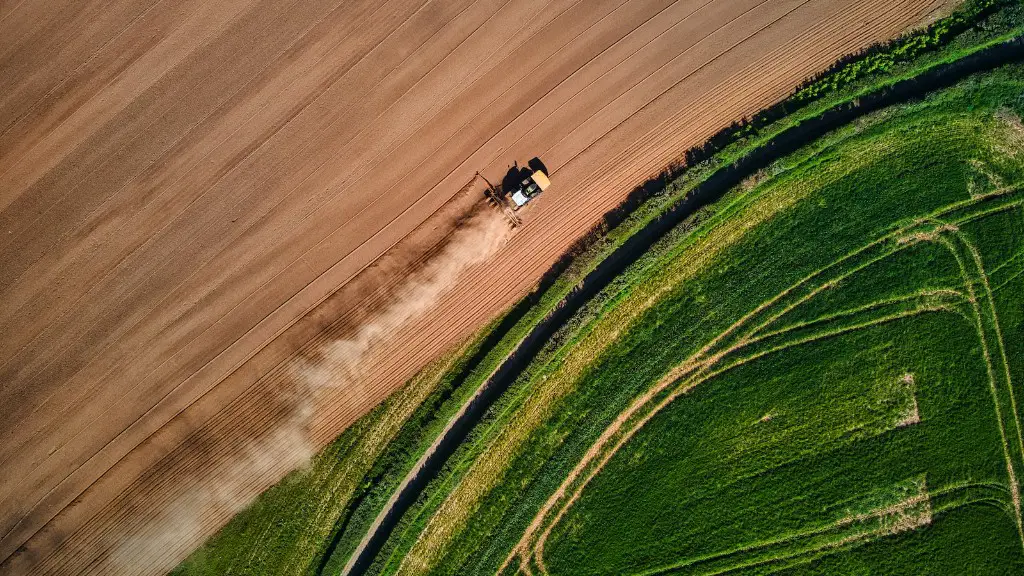The agric sector in Nigeria has the potential to grow the economy and provide employment opportunities. The sector can be improved by increasing government investment, improving infrastructure, and encouraging private sector involvement. A more diversified agric sector would also benefit the economy, as it would provide more goods and services for export and domestic consumption.
by developing a more efficient and effective agricultural sector, agriculture can help improve the Nigerian economy by increasing the amount of food production and decreasing the cost of food production. In addition, agriculture can help diversify the Nigerian economy and create new opportunities for economic growth.
How does agriculture contribute to the economy of Nigeria?
Nigeria’s agricultural sector is a key driver of the country’s economy, accounting for a significant portion of the GDP. In the third quarter of 2021, the sector contributed almost 30 percent to the country’s GDP, an increase of six percentage points compared to the previous quarter. The sector is expected to continue to play a vital role in the country’s economic growth in the coming years.
Agriculture is an important part of the US economy, contributing to the overall GDP directly and indirectly. Agriculture contributes to the GDP through farm production, forestry, fishing activities, textile mills and products, apparel and food and beverage sales, and service and manufacturing. Agriculture also impacts economic development by creating jobs and providing food, fiber and other products and services.
How can we improve Nigerian economy
In order to enhance factor quality in Nigeria, it is important to invest in infrastructure, strengthen land tenure security, improve educational outcomes, liberalize the trade regime and enhance trade and transport facilitation. These measures will help develop value chains and facilitate the efficient reallocation of factors of production, making Nigeria more competitive in the global economy.
The agricultural sector is the backbone of the Nigerian economy, accounting for over half of the GDP at independence in 1960. The sector contributes about 55% of gainful employment and almost 40% of the GDP, before the discovery of oil. The sector has great potential for growth and development, but it faces many challenges, including low productivity, poor infrastructure, and limited access to markets and credit. The government is working to address these challenges and create an enabling environment for the sector to thrive.
Why is agriculture important in Nigeria?
Agriculture is the backbone of Nigeria’s economy and it currently accounts for over 30% of employment opportunities in the country. Nigeria has a total agricultural land area of 708 million hectares and crop production is the largest subsector of agriculture in Nigeria. The country is also a major producer of livestock, fishing and forestry products.
The government is working hard to improve the agricultural sector and to make it more productive and efficient. There are many opportunities for investors in the agricultural sector in Nigeria.
Agriculture is the mainstay of most people in rural areas of Africa and supports some 70-80 percent of the total population, including 70 percent of the continent’s extreme poor and undernourished. Agriculture thus remains crucial for economic growth in most African countries. The rural areas where agriculture is the mainstay are often the areas most in need of economic development. In order to reduce poverty and hunger, and to promote economic growth, it is essential that African countries invest in agriculture and rural development.
What are 3 reasons why agriculture is important?
#1 Agriculture is the main source of raw materials for many industries.
#2 Agriculture is important to international trade.
#3 Agriculture plays a big role in a nation’s revenue.
#4 Agriculture provides employment for many people.
#5 Agriculture is crucial to a country’s development.
#6 Agriculture can help heal the environment.
#7 Agriculture goes hand-in-hand with war.
#8 Agriculture is a major source of food for people.
#9 Agriculture is a major source of income for farmers.
#10 Agriculture is a vital part of the economy.
Nigeria needs to increase its spending from its current very low levels, to promote economic development. The key to raising public spending lies in urgently raising more revenue. At 7% of GDP in 2021, Nigeria’s revenue to GDP ratio is among the five lowest in the world. Nigeria needs to close this revenue gap urgently to finance its development agenda.
What is the major problem of Nigerian economy
The findings of a new study are cause for alarm in Nigeria. The number of Nigerians living in poverty rose by 35 million in 2022, according to the study. The country’s inflation rate increased to 21% in 2022, compared with an average of 106% for emerging and developing economies and 88% for the world. This level of economic hardship could present further risks to Nigeria’s security.
Since the late 1960s, the Nigerian economy has been based primarily on the petroleum industry. A series of world oil price increases from 1973 produced rapid economic growth in transportation, construction, manufacturing, and government services. However, these advances were largely offset by a decline in agriculture and an increase in unemployment.
Why agriculture is the backbone of Nigeria economy?
Despite the central role that agriculture plays in Nigeria, the sector is plagued by a number of challenges. One of the biggest problems facing Nigerian farmers is a lack of access to credit. This limitation on financing has stifled the growth of the sector and prevented many smallholder farmers from expanding their operations. In addition, the agricultural sector in Nigeria is also undercut by poor infrastructure, limited access to markets, and a lack of modern technology.
The Nigerian government has attempted to address some of these issues through a variety of initiatives, including the launch of the Agriculture Promotion Policy in 2016. This policy included a number of measures designed to boost the sector, such as increasing access to financing, investing in infrastructure, and promoting the use of technology. While these initiatives have had some positive impact, much more needs to be done to truly transform the agricultural sector in Nigeria.
agriculture can be profitable because food is a necessity that people will always need. It is a stable industry that can be relied upon to provide a consistent income. There are many different types of agriculture, such as cash crops, food crops, fruit crops, etc., so there is a wide range of potential profits that can be made. However, it is important to remember that agriculture is a long-term investment, and it takes time and effort to build up a successful farm.
What impact does agriculture have on the African economy
The introduction of agriculture had a profound impact on early African societies. It helped them to live in larger and more permanent settlements, led to a significant increase in population, and resulted in the development of sophisticated tools, such as the stone axe. Agriculture also led to the rise of settled societies, which in turn brought about a number of social, economic, and political changes.
Africa’s agricultural economy is a vital part of the continent’s overall economy and employs a large percentage of the population. Agriculture is also an important economic activity for many of Africa’s poor, who live in rural areas. The agricultural economy typically accounts for a significant portion of Africa’s GDP, making it a vital sector for the continent’s economy.
What are the problems of agriculture in Nigeria?
Agriculture is a critical sector of the Nigerian economy, accounting for about 40% of GDP and employing over 70% of the workforce. In recent years, the sector has been under pressure due to a combination of factors, including climate change, agro-finance, inputs, and research funding.
Climate change is a major threat to agriculture in Nigeria. The country is already experiencing more extreme weather conditions, including floods and droughts. These conditions are expected to worsen in the coming years, which will have a devastating impact on crop production.
Agro-finance is another challenge facing the sector. Access to credit is essential for farmers to invest in inputs and improve their productivity. However, due to the high interest rates charged by banks, many farmers are unable to obtain loans.
Inputs are another cost that farmers must bear. Fertilizer, seeds, and other inputs are essential for agriculture, but they are often too expensive for small-scale farmers. This puts them at a competitive disadvantage and reduces their chances of success.
Finally, research funding is essential for the development of new and improved crop varieties that can withstand the effects of climate change. However, the Nigerian government has been investing less and less in agricultural research
Farming is a great way to get exercise and fresh air, and it can be a very rewarding and stimulating career. It is also an important source of income in rural areas, and can help to develop younger generations. Farming can also help the environment thrive.
What is the importance of agriculture in Africa
The African continent is rich in natural resources, including minerals, oil, and gas. These resources provide employment for about two-thirds of the continent’s working population and for each country contribute an average of 30 to 60 percent of gross domestic product and about 30 percent of the value of exports. African countries are also working to develop their manufacturing and service industries, which will provide even more employment opportunities and help to diversify their economies.
Nigeria’s economic potential is constrained by many structural issues. These include inadequate infrastructure, tariff and non-tariff barriers to trade, obstacles to investment, lack of confidence in currency valuation, and limited foreign exchange capacity. Nigeria will need to address these issues in order to unlock its economic potential.
Final Words
The agriculture sector in Nigeria has the potential to drive economic growth and reduce poverty levels in the country. According to the World Bank, the sector contributes about 40% to Nigeria’s GDP and employs over 60% of the labor force. The sector also has the potential to drive export growth as Nigeria is a major producer of agricultural commodities such as cocoa, coffee, cotton, and palm oil.
There are a number of policy interventions that can be undertaken to improve the agriculture sector in Nigeria and drive economic growth. One such intervention is to invest in agricultural research and development to improve productivity and incomes of smallholder farmers. The government can also provide financial and other support to smallholder farmers to enable them to access inputs and credit. In addition, the government can create an enabling environment for the private sector to invest in the agriculture sector.
The Agricultural sector is the backbone of the Nigerian economy and it has the potential to create more jobs and spur economic growth. One way the Agricultural sector can improve the Nigerian economy is by increasing agricultural productivity through the use of technology and improved farming practices. Additionally, the Agricultural sector can contribute to economic growth by diversifying into value-added activities such as processing and packaging. By taking these steps, the Agricultural sector can play a key role in improving the Nigerian economy.





